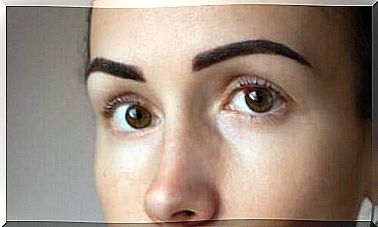Food Additives: How Many Types Are There?

Food additives are substances used in order to enhance the organoleptic characteristics of foods or to improve their conservation. Although they are generally safe for health, the use of some additives is controversial.
First, it is necessary to clarify that there are several types, classified into groups. Some are harmless to the human body or even positive, as in the case of gelling agents. Others, on the other hand, are under discussion because of the effects they exert on the intestinal microbiota. We are talking about sweeteners.
Types of food additives
Let’s take a brief review of the main categories of food additives and the effects they have on our body.
1. Preservatives
The task of preservatives is to reduce the microbiological risk of food, therefore to lengthen its storage times. Many are harmless because they cannot be metabolized or absorbed in the intestine.
Nonetheless, nitrites, among the most common, can increase the risk of some cancers. This is confirmed by a research published in the Nutrients magazine .
They are used by the meat industry and the main reason why the consumption of processed red meat is not recommended. This food seems to worsen health conditions precisely because of the additives present, including nitrites.

2. Flavoring
They are added to modify or enhance the smell of food. They are generally harmless to health, but when consumed in excessive quantities they can cause intestinal upset. Among the most common side effects is diarrhea.
They are not, however, harmful in the long run; or at least, a possible harmfulness has not yet been clinically proven.
3. Dyes
Some dyes were banned after their relationship with various cancers was proven. It must be said that nowadays many pigments used to flavor food not only have no negative effects on health, but help prevent some diseases.
This is the case of anthocyanins, responsible for the color of blueberries, which exert an antioxidant effect, according to a study published in Critical Reviews in Food Science and Nutrition.
When reading the labels affixed to foods, you will need to pay attention to the declared food additives. If the dyes are natural (especially plant phytonutrients), there is no need to classify the product as harmful; this unless some other substance is present in the composition that makes us suspect the opposite.
4. Sweetening additives
This group of additives is the subject of much controversy among nutrition experts. Sweeteners replace sugar, but there is no certainty that they are nutritionally better. In this group, saccharin, stevia, sucralose and aspartame stand out.
Although some sources claim that many of these chemicals are not metabolized in the gut, most research reports negative effects on the gut microbiota. Certainly the results cannot be extrapolated directly, but it is also true that there are no long-term studies that confirm their safety.
5. Flavor enhancers
The group of flavor enhancers includes all food additives which have the task of improving the organoleptic characteristics of dietetic products. Among these we recall monosodium glutamate, responsible for the recently identified umami flavor and present above all in oriental cuisine.
Numerous industrial products contain these additives that improve food enjoyment and palatability. They are not harmful to health, but excessive amounts of salt must nevertheless be avoided.
6. Stabilizers, gelling agents, emulsifiers
This group of additives has the task of improving the texture of food. They do not have a negative effect on the human body, on the contrary.
Some of the products in this group have a stimulating effect on the intestinal microbiota, improving its functions. Among these we find agar-agar.
Regular consumption of this gelling agent causes fermentation in the intestine and promotes the development of bacterial colonies. This process can improve nutrient absorption, reducing the risk of obesity and other metabolic diseases. This is what a research published in the journal Gut Microbes states .

7. Modified starches
They are added to baked goods to improve their elastic property. They are composed of a mixture of polysaccharides, which is why they are included among the carbohydrates. In themselves they are not harmful to our body.
For a sedentary person, however, an excessive intake of dietary carbohydrates is certainly not helpful. The same cannot be said for athletes who require a greater need for carbohydrates, having to replenish the glycogen stores used during sport.
Subjecting modified starches to high temperatures produces toxic waste products, such as acrylamide. These substances are harmful to health.
8. Acidulants
Even acidulants have the task of enhancing the flavor of food. These include sodium sulphate and potassium sulphate. They do not cause unwanted effects, as long as the recommended doses are not exceeded.
If not, they could have a noticeable laxative effect. This happens, for example, when large quantities of candy or chewing gum are consumed.
9. Food additives with enzymes
Enzymes are typically added to foods intended for those with food intolerances or dietary supplements. The most common case are products for those who are lactose intolerant, which contain lactase, an enzyme useful for improving sugar metabolism.
It is also common to find protein concentrates enriched with digestive enzymes. They improve the digestion of nutrients and prevent gas formation. Enzymes are not harmful to health and their use is considered safe.
10. Antioxidant additives
Antioxidants are able to block or delay the oxidation of foods, thus extending their conservation. Ascorbic acid or vitamin C has this function.
It is used to prevent rancidity of fruit such as avocado or apple. Including them in the diet has positive effects on the immune system. Increasing your vitamin C intake has been shown to accelerate recovery from colds.
General functions of food additives
Let’s review the main functions of additives to better understand why they are used so often.
They retain the nutritional value
Many of the substances used in the food industry are intended to preserve the nutritional value of products. For example, preventing oxidation guarantees a better conservation of vitamins by reducing their contact with oxygen.
They preserve food safety
Preservatives make it possible to extend food storage times by reducing the risk of microbial contamination. In this sense, they protect our health by preventing any food poisoning.
They ensure a good pH balance in foods and support fermentation
Most of the additives used by the food industry guarantee the acid-base balance of the products. The result is better food preservation. Furthermore, the gelling agents and stabilizers allow a more effective fermentation; they therefore give added value to food by promoting the development of bacteria that are friendly to the human body.
More color and flavor to foods thanks to food additives
This is one of the main reasons why food additives are used. The possibility of improving the organoleptic characteristics of foods means significantly increasing sales with greater profits for businesses.
However, it is important to exclude any health risk, an aspect that is not always taken into account in the right way.
They improve the texture of food
You may have already wondered why the consistency of ultra-processed foods is always perfect and different from the dishes we prepare at home. The secret is the presence of food additives.
These substances help to hold the ingredients together and give more softness or rubberiness, improving the sensory experience.

Undesirable effects of food additives
Although food additives have a specific field of application and purpose, they are not always safe for health. If consumed in excess, they actually cause a number of unwanted effects.
We must therefore pay attention to their presence, especially nitrites and artificial sweeteners. The latter alter intestinal bacterial colonies with effects on metabolism and digestion.
Food additives: ubiquitous substances
It should be noted that additives are present in a large number of foods nowadays. It is very difficult to avoid consumption and perhaps it is not even advisable. It is therefore important to moderate their intake, even if this is not true for all additives.
Finally, the basis of a healthy diet lies in the variety and prevalence of fresh products compared to highly processed ones. In addition to this, it must be balanced from the caloric point of view to avoid taking on excessive fat mass.









